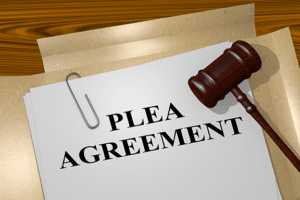Can I Take a Plea to Lessen the Penalties of a DWI Charge in New Jersey?

What is a plea agreement?
You have likely heard the term “plea agreement” many times, but what does it actually mean from a legal perspective? A plea bargain is an agreement between the prosecutor and the defendant (often represented by defense counsel), with terms that allow the defendant to plead guilty to a lesser charge in exchange for more serious charges being dismissed. You can also take a plea to reduce the penalties you are facing for a specific charge. In these cases, the prosecutor will recommend the minimum to the judge prior to sentencing. Although plea agreements to downgrade or dismiss certain charges happen regularly in the New Jersey criminal justice system, some charges like DWI have their own rules and procedures.
Are plea agreements allowed in New Jersey DWI cases?
Here, we will explain the evolution of the law with regard to DUI plea agreements in New Jersey. On January 24, 2005, the acting Attorney General issued guidelines concerning the prosecution of DWI and DWI refusal violations “to promote the uniform enforcement of the DWI and refusal statutes” in New Jersey. The DWI statute, N.J.S.A. 39:4-50, governs driving under the influence of liquor, “street drugs” like marijuana and heroin, and prescription drugs such as Oxycontin. As for the DWI refusal statute, N.J.S.A. 39:4-50.2, this charge applies when a person refuses to submit to a chemical breath test, which is used to determine their Blood Alcohol Concentration (BAC).
With regard to DWI and DWI refusal, the AG’s directive states:
“No plea agreements whatsoever will be allowed in drunken driving or certain drug offenses. If a defendant is charged with driving while under the influence of liquor or drugs (N.J.S.A. 39:4-50) and refusal to provide a breath sample (N.J.S.A. 39:4-50.2) arising out of the same factual transaction, and the defendant pleads guilty to the N.J.S.A. 39:4-50 offense, the judge, on recommendation of the prosecutor, may dismiss the refusal charge.”
In other words, prosecutors were prohibited from making an agreement to reduce your DUI charges or the penalties associated with a DWI conviction. However, if you agreed to plead guilty to a DWI and you had also been charged with refusal, the court could dismiss the refusal charge. In that case, you would still face the mandatory penalties that a DWI entails under New Jersey law. If you had previous DWI convictions, then the consequences of your current DWI case worsen significantly.
Then, on December 23, 2023, New Jersey Governor Phil Murphy signed a significant change into law regarding plea bargaining for DUI. With the new law, DWI defendants can take a plea to get reduced or amended charges in their cases. For instance, a skilled DWI defense lawyer can help you reduce your drunk driving charge to a reckless driving charge in order to lessen the impacts in terms of penalties and avoid having a DUI conviction on your driving record, which can substantially impact your potential sentence if you find yourself in this type of situation again.
Plea Bargaining for Collateral Charges of a DUI
If you have been charged with a collateral offense arising from the same incident, such as possession of a controlled dangerous substance (CDS) or possession of CDS in a motor vehicle, nothing prohibits the prosecutor from offering you a plea agreement with regard to these charges. For example, the prosecution may agree to dismiss a drug charge or a reckless driving ticket in a plea agreement.
How do I get a DWI Charge Dismissed in NJ?
Municipal Prosecutors are also allowed to downgrade or dismiss a DWI charge when there is some legal justification to do so. In other words, if there is an evidentiary issue that significantly lessens the chance a prosecutor will obtain a conviction for drunk driving, they may use their discretion to dismiss a DUI with the consent of the presiding judge. For example, if police lacked probable cause for the motor vehicle stop, then any charges resulting from said stop are “fruit of the poisonous tree” and thus, invalid in the eyes of the law. This is why it is so essential to have an experienced DWI defense lawyer who can thoroughly examine your case to find issues that may be used to argue for a dismissal.
Need a Lawyer for a DWI in New Jersey?
At The Tormey Law Firm, our talented team of DWI attorneys have achieved thousands of dismissals on behalf of clients charged with drunk driving and driving under the influence of drugs throughout New Jersey. You can read just a few of our DWI case victories by following the links below:
- DWI dismissed in Essex County NJ
- Rutherford second offense DWI dismissed
- Edison DWI charges dismissed
- DWI in a school zone dismissed in Boonton, New Jersey
- Dismissal of DWI and refusal charges in Saddle Brook NJ
If you have been arrested for DWI in New Jersey, it is imperative to find out your legal options and possible defenses from an experienced DWI defense lawyer. Contact The Tormey Law Firm now at (201)-556-1570 or online for a free consultation.

